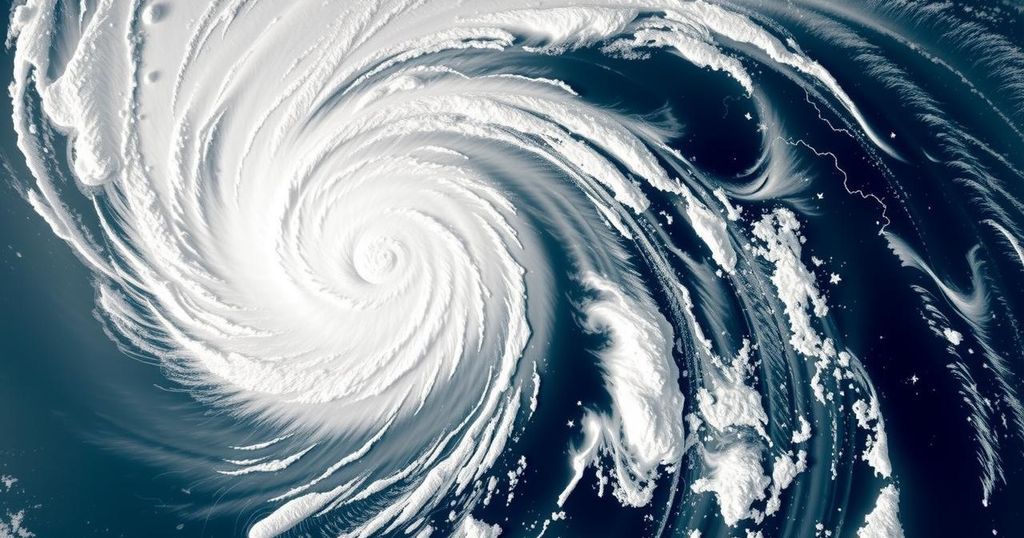Tropical Cyclone Chido has severely impacted Mayotte, causing widespread damage as it moves towards Mozambique. Wind speeds reached over 220 km/h, destroying roofs and power supplies. Authorities have mobilized emergency services, while concerns grow for fishermen lost at sea in the neighboring Comoros. The cyclone is projected to affect millions in Mozambique and surrounding regions soon, highlighting the increasing severity and frequency of cyclones due to climate change.
Tropical Cyclone Chido has wreaked havoc across the French territory of Mayotte, leaving extensive damage in its wake as it advances towards eastern Africa. With wind speeds exceeding 220 kilometers per hour, the cyclone reportedly uprooted numerous roofs and destroyed vulnerable structures in Mayotte, which comprises approximately 300,000 residents over two main islands. Fortunately, there are no immediate reports of casualties; however, the cyclone has prompted serious concerns regarding infrastructure and safety.
Mayotte’s Prefect, Francois-Xavier Bieuville, described the cyclone as the most destructive to impact the island since 1934, stating that many residents have lost their homes and possessions. He indicated that the highest alert level had been downgraded to facilitate rescue operations now that the cyclone’s most intense phase had passed, yet cautioned residents to stay in sturdy shelters under a continuing red alert directive. Emergency personnel are the only individuals authorized to venture outdoors in the aftermath of the cyclone.
French Interior Minister Bruno Retailleau noted that the impact on Mayotte was severe, with significant damage already being reported. Thousands are without power, and various structures have been dismantled or blown away by the strong winds. To aid in recovery efforts, 110 rescuers and firefighters have been dispatched from mainland France and Reunion, with an additional 140 personnel set to arrive shortly thereafter.
The cyclone has also affected the Comoros islands located north of Mayotte, where authorities have expressed concern for several fishermen unaccounted for at sea. Several precautionary measures have been enacted, including the temporary closure of the main airport and schools, as well as a directive for vessels to remain docked.
Chido is forecasted to persist on its eastern trajectory, expected to reach Mozambique by late Saturday or early Sunday. The country’s disaster management agency predicts that up to 2.5 million people could be impacted in the northern provinces. With cyclone season spanning from December to March in the southeastern Indian Ocean, previous cyclones have caused devastation—highlighted by Cyclones Idai and Freddy, which resulted in substantial loss of life and humanitarian crises in southern Africa.
Mayotte, a French territory in the Indian Ocean, is currently experiencing significant repercussions from Tropical Cyclone Chido. Historically, this region is prone to cyclonic activity, particularly from December to March. The frequency and intensity of these storms appear to be escalating, likely exacerbated by climate change. Cyclones pose severe risks, including flooding and the potential for subsequent outbreaks of waterborne diseases such as cholera, a challenge that countries like Mozambique, Malawi, and Zimbabwe have faced following previous storms. Given the economic vulnerabilities of these nations—despite their minimal contributions to global climate issues—the humanitarian impacts of cyclones can be particularly devastating.
In summary, Tropical Cyclone Chido has substantially impacted Mayotte and is projected to cause further destruction as it moves toward Mozambique. While immediate casualties have not been reported, the damage to infrastructure and homes is significant, with ongoing efforts to aid the affected population. The cyclical nature of such severe weather events raises concerns about the resilience of these vulnerable regions, especially in the context of climate change, which is likely exacerbating such disasters.
Original Source: www.voanews.com






